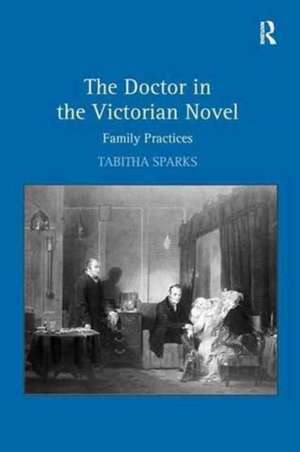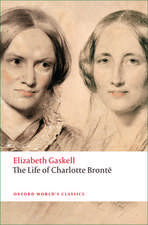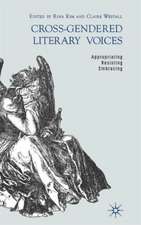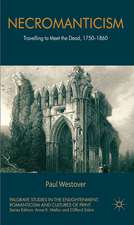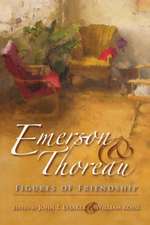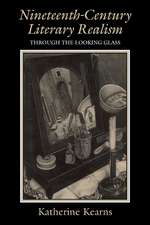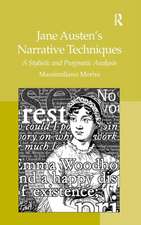The Doctor in the Victorian Novel: Family Practices
Autor Tabitha Sparksen Limba Engleză Paperback – 16 noi 2016
| Toate formatele și edițiile | Preț | Express |
|---|---|---|
| Paperback (1) | 469.34 lei 6-8 săpt. | |
| Taylor & Francis – 16 noi 2016 | 469.34 lei 6-8 săpt. | |
| Hardback (1) | 1054.71 lei 6-8 săpt. | |
| Taylor & Francis – 7 oct 2009 | 1054.71 lei 6-8 săpt. |
Preț: 469.34 lei
Nou
Puncte Express: 704
Preț estimativ în valută:
89.82€ • 93.53$ • 75.91£
89.82€ • 93.53$ • 75.91£
Carte tipărită la comandă
Livrare economică 08-22 martie
Preluare comenzi: 021 569.72.76
Specificații
ISBN-13: 9781138275409
ISBN-10: 1138275409
Pagini: 186
Dimensiuni: 156 x 234 x 15 mm
Greutate: 0.45 kg
Ediția:1
Editura: Taylor & Francis
Colecția Routledge
Locul publicării:Oxford, United Kingdom
ISBN-10: 1138275409
Pagini: 186
Dimensiuni: 156 x 234 x 15 mm
Greutate: 0.45 kg
Ediția:1
Editura: Taylor & Francis
Colecția Routledge
Locul publicării:Oxford, United Kingdom
Cuprins
Contents: Introduction; Doctoring the marriage plot: Harriet Martineau's Deerbrook and George Eliot's Middlemarch; Textual healing: George MacDonald's Adela Cathcart; Marital malpractice at mid-century: Braddon's The Doctor's Wife and Gaskell's Wives and Daughters; Myopic medicine and far-sighted femininity: Wilkie Collins's Armadale and Heart and Science; New women, avenging doctors: gothic medicine in Bram Stoker and Arthur Machen; The 'fair physician': female doctors and the late-century marriage plot; Conclusion - 'The overstimulated nerve ceases to respond': Arthur Conan Doyle's medical modernism; Bibliography; Index.
Notă biografică
Tabitha Sparks, Assistant Professor of English at McGill University, specializes in the nineteenth-century British novel. Her work has appeared in book collections, and journals including Cultural Studies and the Journal of Narrative Theory.
Recenzii
’Drawing inspiration from the rich critical heritage on the thematics of the marriage plot and a wealth of diverse interdisciplinary studies in Victorian literature and science, Sparks offers a rich and compelling investigation into the development of the medical profession and its relevant cultural implications.’ Rivista di Studi Vittoriani 'This is a closely-argued and [...] clearly written investigation, directed at an audience familiar with recent Victorian fiction criticism, which deserves close reading and (as good critical discussion of text will) drives the reader back to the novels chosen for analysis.' Gaskell Journal 'Literary scholars are likely to be satisfied by Sparks' diverse selection of texts, which combines familiar with forgotten fiction, and the well-organised critical readings, which balance clarity and subtlety.' Social History of Medicine '[Sparks's] book tackles the figure of the doctor from a literary point of view, and her analysis of the impact of the doctor-character on the marriage-plot offers an original insight into Victorian realism. ... the range of canonical, popular or less known novels and short stories Sparks examines, makes it an interesting study of the figure of the "doctor" and its evolution.' Miranda 'While in some respects the doctor appeared to be the very essence of self-made, middle-class masculine benevolence and rationality, Sparks finds that through the marriage plot writers of fiction reveal a very flawed character and it is the evident ''tension between medical and romantic epistemologies'' that the book addresses. To explore this tension Sparks interrogates the correlation between the doctor's success in the domestic sphere and the trajectory of his public career. The results of this analysis are intriguing.' English Studies 'Demonstrating an unusually wide reading, especially of popular literature, Sparks discusses no fewer than forty-four doctor characters throughout the course of the book. This fe
Descriere
Following the decline of the marriage plot in Victorian novels by a range of novelists, including Harriet Martineau, George Eliot, Elizabeth Gaskell, George MacDonald, and Bram Stoker, Tabitha Sparks argues that a narrative's stance towards scientific reason is revealed in the figure of the doctor. Novels with romantic doctors deny the authority of empiricism, while those with clinically minded doctors uphold the determining logic of science and threaten the novel's romantic plot.
